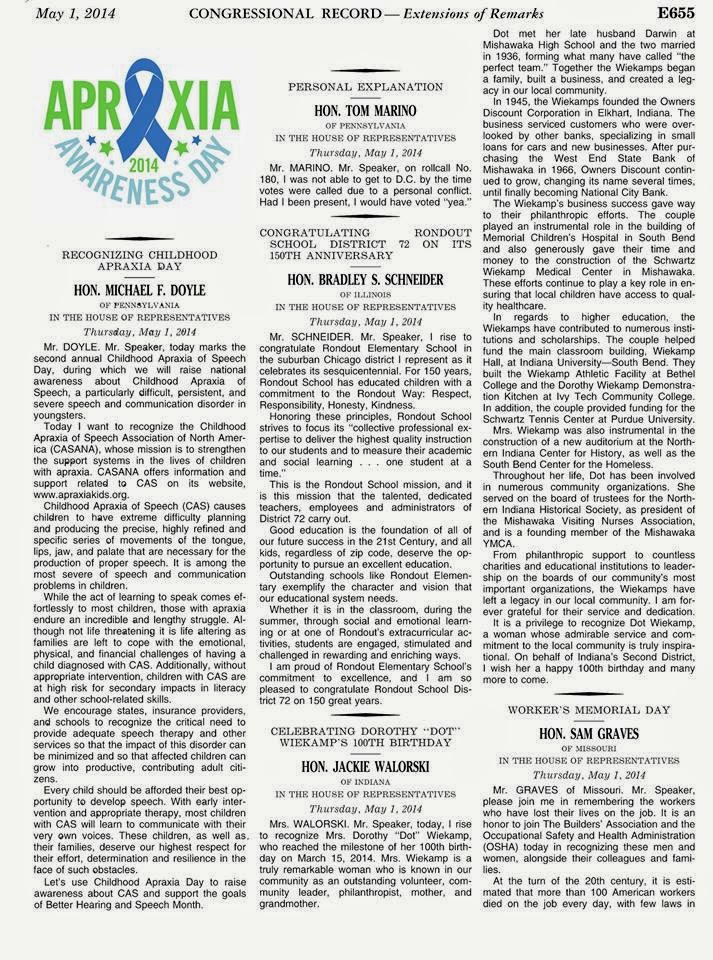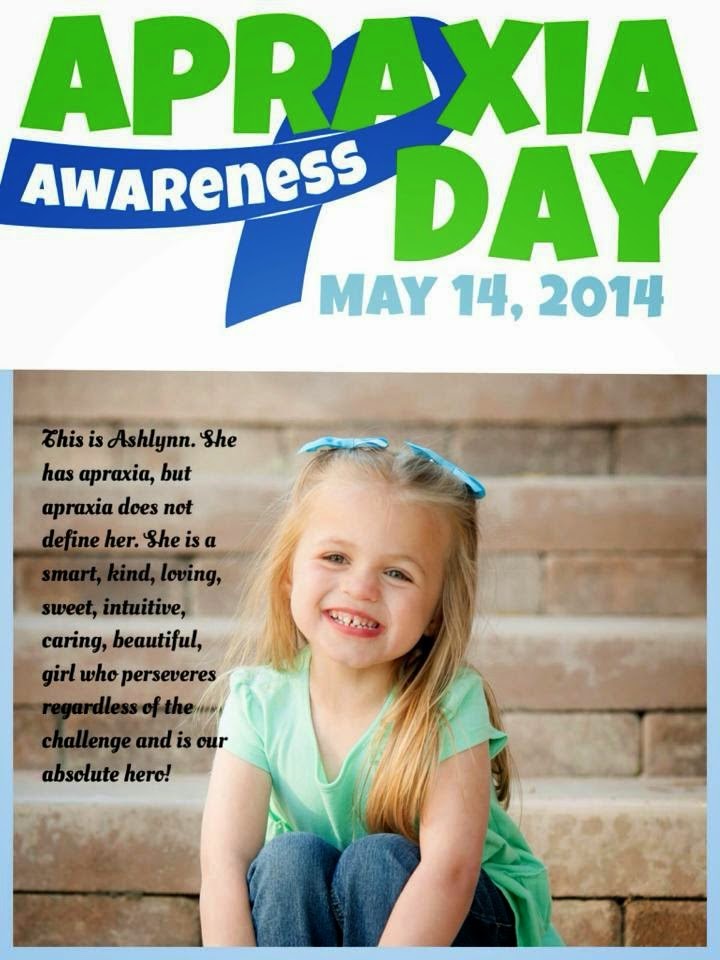Apraxia is elusive, even to professionals.
 Today is the second annual Apraxia Awareness Day, and in case you haven’t heard, this year it made its way into the United States Congressional Record! That’s a big step in spreading awareness, but there is still a long way to go.
Today is the second annual Apraxia Awareness Day, and in case you haven’t heard, this year it made its way into the United States Congressional Record! That’s a big step in spreading awareness, but there is still a long way to go.
I was able to blog about the very first apraxia awareness day here First annual apraxia awareness day and I’m so excited to be doing it again this year.
Most people still haven’t even heard of apraxia. Doctors, including my own pediatrician had only vaguely heard of it, and many SLP’s still don’t know how to treat it correctly. I was one of them! I had a 20 page small folder on Childhood Apraxia of Speech from graduate school, and that was it! Luckily I had an amazing mentor who took me to an apraxia conference when I first started in the field, and I was able to treat the disorder successfully with the three kiddos I saw at the school-aged level.
However, then my own daughter was born. Her first year was stressful. I hated the baby screeners at the doctor’s office. She wasn’t cooing or really babbling, but she was so alert and had the best giggle! Everyone assured me she would talk in her own time, but every screener put her further and further behind. She crawled late, walked late, had poor balance and choked on her food and drinks, oh, and did I mention she wasn’t talking?? I attended conference after conference on early intervention for speech. I then would work all day and then came home and used the techniques on her. One problem, they didn’t work!! I was stressed, worried, and constantly thinking about her development. Even though I was treating it in the elementary school, it didn’t occur to me that this disorder was also behind her development delays.
When I took her to Child Find I remember the evaluation like it was yesterday. I knew she was behind, but seeing it with another SLP was heartbreaking. I wanted to gather her up and leave so many times. When the SLP came to talk to me, she said four words that I will never forget, and at the moment I instantly realized were true: “Laura, this is apraxia.”
My God. How did I miss that??? However, I instantly knew she was right. I was dealing with apraxia.
Apraxia.
Apraxia.
Oh God no, not apraxia. Why MY baby?? I cried in the car after the evaluation. I sent a text to an SLP friend “She has apraxia. I’m devastated.”
My mother in law was watching my baby. I went home and cried. “Will she ever talk?” she asked. “Oh yes” I responded. She just has to face the biggest hills in order to do it. I cried some more.
I’m really not sure what’s worse. Being a parent who doesn’t know what apraxia really is, or being a parent who knows exactly what the monster is, and just how hard she’ll have to work to overcome it.
After the devastation….and to be honest I really did feel devastated, I mourned it, and then I became angry. I realized now why all the early intervention I was doing with her EVERY night wasn’t working!! She had apraxia!! Apraxia has to be treated differently. You need a motor based treatment approach, not a language approach. Why didn’t I know the signs of apraxia in young children?? And you know what? Once I put her with an SLP trained in apraxia, she made progress IMMEDIATELY.
IMMEDIATELY!!
I had a masters degree in this!! It was unbelievable to me. I reviewed all my early intervention conference notes and power points. Not ONCE was apraxia mentioned. It made me think, are early interventionists even looking at apraxia? Why are we treating all speech delays the same way?
After I got over being angry, I got determined. This happened to me for a reason. I had successfully treated two cases in the schools, but I needed to know the ins and outs of this disorder. I’m an SLP and MY daughter had apraxia and I missed it. I missed it!! As I think of that right now I’m shaking my head. That’s just not ok. There needs to be more information out there. It needs to be as well known to SLP’s as their everyday speech and language disorders are.
That is my mission now. I went to apraxia-kids.org and started signing up for webinars. I went to every apraxia conference that came to Denver since that time, and was fortunate enough that the Apraxia National Conference came to Denver last summer in 2013. I saw so many apraxia experts. I found out about an apraxia intensive bootcamp. I applied and I was accepted! I go this July. Last February, I gave my first ever professional presentation to a packed room of school based SLP’s. I didn’t claim to be an expert, but I had come A LONG way since that mom crying in her car. The interest was so great that people were sitting on the floor. That’s how much SLP’s are craving this information.
I asked my clinical director at the private practice to support me in my mission to specialize in apraxia. She didn’t even blink. I am so blessed to know her.
I started this blog, and now I started a facebook page SLP Mommy of Apraxia. I want to give simple tips on things to do at home, and also spread awareness.
 As for Ashlynn? Well, she’s basically just pretty amazing. She meets every challenge head on without
As for Ashlynn? Well, she’s basically just pretty amazing. She meets every challenge head on without
frustration. She overcomes every obstacle in her path, no matter how many time she has to try. She’s speaking in 4-8 word sentences, started independently doing show and share at her school, and has many friends she plays and socializes with. She still needs speech. We still work everyday on correcting her errors and mapping the motor plan, but I know she’s going to be fine now. She’s not only my hero, but my inspiration and why I stand up on TODAY, May 14th for EVERY child who deserves a voice on this second ever Apraxia Awareness Day.
Signs and Symptoms:
– Little to no babbling
– Only a few different consonant and vowel sounds
– Inconsistent productions of vowel and consonant sounds
– Disrupted prosody
– Difficulty with co-articulation of speech sounds
– Comprehends much more than they can speak
Diagnosis
– Only Certified SLP’s trained in this disorder should diagnose it. Pediatrician’s and neurologists do not go through the extensive testing an SLP will do to provide a thorough differential diagnosis.
Treatment
– A motor based treatment approach to therapy must be initiated. Therapy should be focusing on the planning, coordinating, and sequencing of speech sounds, usually with some sort of verbal or visual cueing system.
– To find professionals in your area see this link: Apraxia Experts by state
Most of all: Spread the Word!! Knowledge is Power.